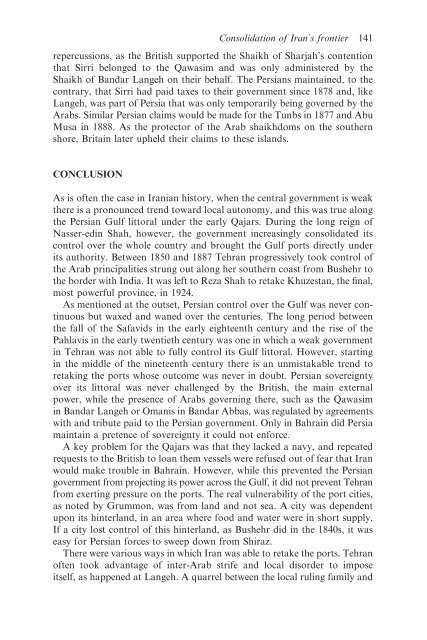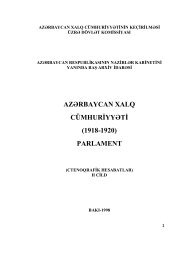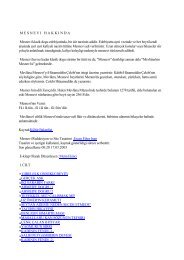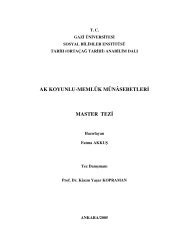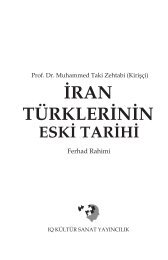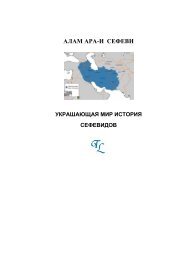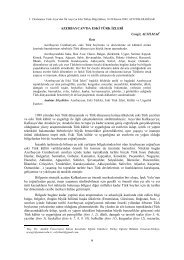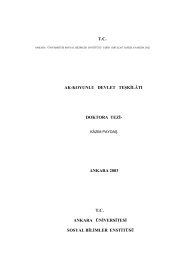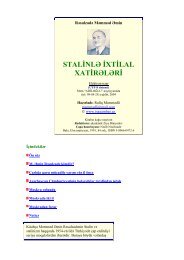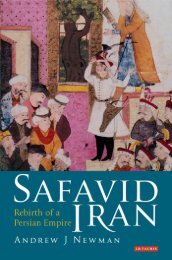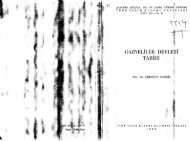War and Peace in Qajar Persia: Implications Past and ... - Oguzlar.az
War and Peace in Qajar Persia: Implications Past and ... - Oguzlar.az
War and Peace in Qajar Persia: Implications Past and ... - Oguzlar.az
- No tags were found...
Create successful ePaper yourself
Turn your PDF publications into a flip-book with our unique Google optimized e-Paper software.
Consolidation of Iran’s frontier 141repercussions, as the British supported the Shaikh of Sharjah’s contentionthat Sirri belonged to the Qawasim <strong>and</strong> was only adm<strong>in</strong>istered by theShaikh of B<strong>and</strong>ar Langeh on their behalf. The <strong>Persia</strong>ns ma<strong>in</strong>ta<strong>in</strong>ed, to thecontrary, that Sirri had paid taxes to their government s<strong>in</strong>ce 1878 <strong>and</strong>, likeLangeh, was part of <strong>Persia</strong> that was only temporarily be<strong>in</strong>g governed by theArabs. Similar <strong>Persia</strong>n claims would be made for the Tunbs <strong>in</strong> 1877 <strong>and</strong> AbuMusa <strong>in</strong> 1888. As the protector of the Arab shaikhdoms on the southernshore, Brita<strong>in</strong> later upheld their claims to these isl<strong>and</strong>s.CONCLUSIONAs is often the case <strong>in</strong> Iranian history, when the central government is weakthere is a pronounced trend toward local autonomy, <strong>and</strong> this was true alongthe <strong>Persia</strong>n Gulf littoral under the early <strong>Qajar</strong>s. Dur<strong>in</strong>g the long reign ofNasser-ed<strong>in</strong> Shah, however, the government <strong>in</strong>creas<strong>in</strong>gly consolidated itscontrol over the whole country <strong>and</strong> brought the Gulf ports directly underits authority. Between 1850 <strong>and</strong> 1887 Tehran progressively took control ofthe Arab pr<strong>in</strong>cipalities strung out along her southern coast from Bushehr tothe border with India. It was left to Reza Shah to retake Khuzestan, the f<strong>in</strong>al,most powerful prov<strong>in</strong>ce, <strong>in</strong> 1924.As mentioned at the outset, <strong>Persia</strong>n control over the Gulf was never cont<strong>in</strong>uousbut waxed <strong>and</strong> waned over the centuries. The long period betweenthe fall of the Safavids <strong>in</strong> the early eighteenth century <strong>and</strong> the rise of thePahlavis <strong>in</strong> the early twentieth century was one <strong>in</strong> which a weak government<strong>in</strong> Tehran was not able to fully control its Gulf littoral. However, start<strong>in</strong>g<strong>in</strong> the middle of the n<strong>in</strong>eteenth century there is an unmistakable trend toretak<strong>in</strong>g the ports whose outcome was never <strong>in</strong> doubt. <strong>Persia</strong>n sovereigntyover its littoral was never challenged by the British, the ma<strong>in</strong> externalpower, while the presence of Arabs govern<strong>in</strong>g there, such as the Qawasim<strong>in</strong> B<strong>and</strong>ar Langeh or Omanis <strong>in</strong> B<strong>and</strong>ar Abbas, was regulated by agreementswith <strong>and</strong> tribute paid to the <strong>Persia</strong>n government. Only <strong>in</strong> Bahra<strong>in</strong> did <strong>Persia</strong>ma<strong>in</strong>ta<strong>in</strong> a pretence of sovereignty it could not enforce.A key problem for the <strong>Qajar</strong>s was that they lacked a navy, <strong>and</strong> repeatedrequests to the British to loan them vessels were refused out of fear that Iranwould make trouble <strong>in</strong> Bahra<strong>in</strong>. However, while this prevented the <strong>Persia</strong>ngovernment from project<strong>in</strong>g its power across the Gulf, it did not prevent Tehranfrom exert<strong>in</strong>g pressure on the ports. The real vulnerability of the port cities,as noted by Grummon, was from l<strong>and</strong> <strong>and</strong> not sea. A city was dependentupon its h<strong>in</strong>terl<strong>and</strong>, <strong>in</strong> an area where food <strong>and</strong> water were <strong>in</strong> short supply.If a city lost control of this h<strong>in</strong>terl<strong>and</strong>, as Bushehr did <strong>in</strong> the 1840s, it waseasy for <strong>Persia</strong>n forces to sweep down from Shir<strong>az</strong>.There were various ways <strong>in</strong> which Iran was able to retake the ports. Tehranoften took advantage of <strong>in</strong>ter-Arab strife <strong>and</strong> local disorder to imposeitself, as happened at Langeh. A quarrel between the local rul<strong>in</strong>g family <strong>and</strong>


